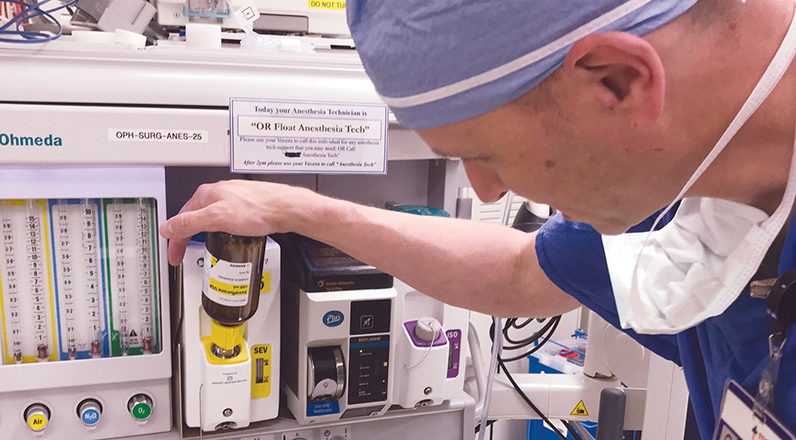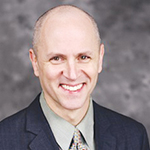
Dr. Brian Chesebro is an anesthesiologist who has worked to convince others to join him in switching to the use of an anesthetic that has a smaller carbon footprint. Chesebro this year became the first medical director of environmental stewardship for Providence St. Joseph Health.
Providence St. Joseph Health has set an ambitious goal: to be carbon negative by 2030. Helping to steer its course is Dr. Brian Chesebro, who recently joined Providence's national advocacy and social responsibility division as medical director of environmental stewardship.
Chesebro will help transform Providence's clinical delivery of care by reducing pollution through mitigation, developing resilient systems and advocating for planet-safe policies and decisions.

An anesthesiologist by training, his personal struggle and journey have helped put Providence on its climate-friendly path. "In a way, it is my mental health therapy," he says. "This job and this work saved me."
True to his (Bitter)roots
Raised on a ranch in Montana's Bitterroot Valley, Chesebro loved rock climbing, skiing and backpacking with friends and family. His father conducted research in virology at the National Institutes of Health
Rocky Mountain Laboratories in Hamilton.
"My whole life was built around the environment," says Chesebro. "I was simultaneously exposed to environmental stewards and the world of science and biomedical research."
Yet he didn't envision his love of the great outdoors shaping his career path when he graduated from The Johns Hopkins University School of Medicine in 2003 or when he completed his residency in anesthesiology and perioperative care at the University of California, San Francisco, in 2008. The next year, he joined the Oregon Anesthesia Group, which provides services to three Providence hospitals. Starting in 2015, he served concurrently with the anesthesia group and as Providence's medical director of anesthesiology and perioperative quality.
Eco-despair
Living through wildfires, flooding and other extreme weather wrought from climate change took a toll on his spirit and led in 2016 to behavioral health struggles known as solastalgia. "I call it eco-despair, and I had
a severe case," he says. "I think it's an underappreciated and underrecognized mental health challenge we face as a species as we try to make sense of climate change."
Seeking guidance, Chesebro turned to the "Hopes and Aspirations for Providence Ministries" document written by the founding Sisters of Providence when they established the health system's public juridic person, Providence Ministries. The document encourages the ministry to be "good stewards of all we have been given for this ministry — our people, our resources, and our Earth."
The message inspired Chesebro to take a personal inventory of his own carbon footprint. He assessed and modified his home energy use, transportation and diet. But he also realized that he could have a larger impact professionally by changing his choice of anesthesia.
According to the international coalition Health Care Without Harm, the health care industry's climate footprint is equivalent to 4.4% of global net emissions. If the health sector was a country, it would be the fifth-largest emitter on the planet. Anesthesia contributes to the sector's emission of greenhouse gases. By choosing the anesthetic sevoflurane over desflurane, Chesebro says clinicians can reduce their carbon footprint by 90% and save money without compromising safety and efficacy for patients.
Spreading the word
A self-described data geek, Chesebro has shared his personal research and findings regarding sevoflurane with his colleagues to encourage them to switch anesthetics. He also has shared his message nationwide, again
with the Hopes and Aspirations document as his touchstone.
"The sisters specifically called out environmental stewardship and expected Providence to be modeled so that others can learn from us," he says. "It's part of the mission that we're constantly reaching out and helping others."
In 2019, Providence Oregon named Chesebro its first medical director of environmental stewardship. Since then, the system's facilities in Oregon have decreased greenhouse gas emissions from anesthesia by 96% and reduced overall carbon emissions by 11.5%. The change has saved the system $2 million annually on the cost of anesthesia.
Chesebro later applied his data-driven approach to environmental stewardship throughout Providence's Oregon facilities, extending it to nonclinical areas. For example, he helped Providence Willamette Falls Medical Center in Oregon City source 100% renewable electricity.
He also helped design and implement the WE ACT Scorecard that each Providence hospital receives every month. The scorecard tracks resource use, cost and carbon emissions categorized by the scorecard's acronym: Waste, Energy and water, Agriculture and food, Chemicals and Transportation.
His new systemwide role is under the umbrella of Providence's advocacy and social responsibility department. Though he has narrowed his responsibility to clinical innovations, his reach extends throughout the seven states that Providence serves. The system hopes that achieving its goal of being carbon negative by 2030 also results in annual savings of $100 million.
Beyond mitigation
To this point, Chesebro says, much of the work has focused on mitigation strategies. More opportunities lie ahead in improving the system's environmental resilience. For example, Providence hospitals, lacking HVAC
upgrades, "struggled to keep the outdoor air distinct from the indoor" during wildfires in 2020 and 2021, Chesebro says. Conversely, with new insulated windows and a reflective skin on the outside, Providence St. Vincent Medical Center stayed cool
enough for patients during a heat dome in Portland in 2021.
"Our infrastructure was not designed for the climate we're experiencing," he says. "We need to think critically and prepare so our doors can stay open and we can remain a safety anchor. We know that when our vulnerable struggle, they often come to a haven, like a hospital, for protection."
Chesebro performs the bulk of his environmental stewardship duties from home, which gives him time to see his three children off to school in the morning.
"I'm in position to help them navigate their early adolescence," he says. "And working from home is better for the environment. I love it. It's a very full life."
Meanwhile, Chesebro continues to provide clinical care in Providence Portland Medical Center's operating rooms two days a week. He says he thinks it's important for those steering the system toward environmental sustainability to be connected to the practice of health care.
"We need to maintain contact to keep a strong sense of what we do in a hospital and how these changes really work," he says. "We can spend a lot of time writing papers, but our ultimate goal is to translate those ideas into action."
